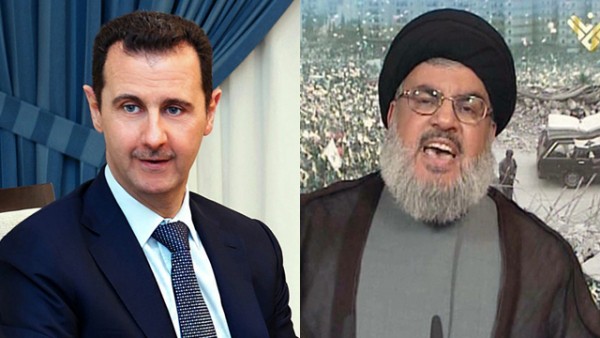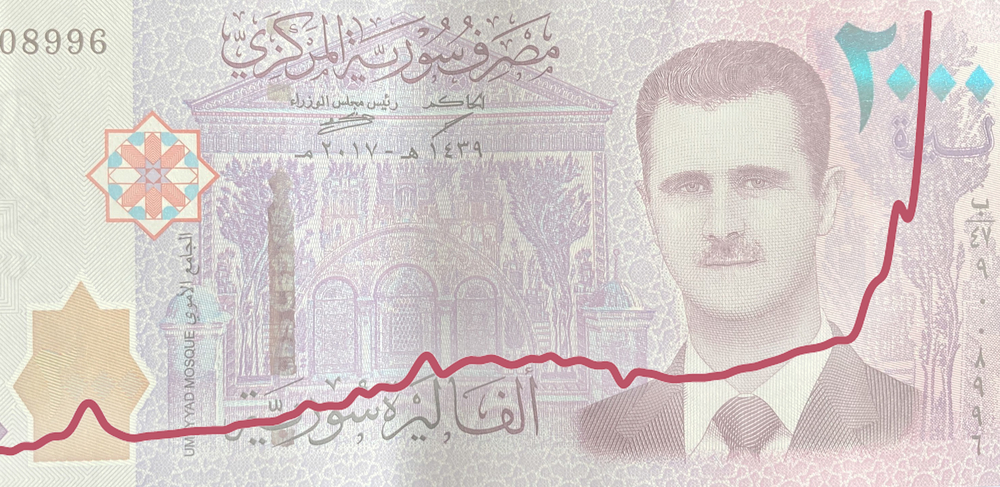- A State Department assessment warned the Syrian regime is worsening Lebanon’s economic collapse.

BY JACK DETSCH
The Trump administration is worried that Syria’s Bashar al-Assad regime is working to undermine neighboring Lebanon by driving up exchange rates for its weakened currency and ratcheting up influence on the fragile government through Iran-backed Hezbollah, according to a State Department finding shared with Congress this summer and obtained by Foreign Policy.
Under pressure from U.S. and international sanctions over its human rights abuses and chemical weapons use during the nearly decade long Syrian civil war, the Assad regime has long been dependent on siphoning money from the Lebanese banking system and smuggling the cash across the border along with fuel, flour, and wheat, experts said, something that Lebanon’s authorities have had trouble preventing.
“The Assad regime continues to exert influence inside the Lebanese government through Hezbollah and other political allies, undermining Lebanon’s independence and sovereignty. Such influence poses significant challenges to Lebanon’s stability,” the report says. “The Assad regime contributed to Lebanon’s recent economic collapse by attempting to extract as much foreign currency from the Lebanese market as possible, making dollars very scarce in Lebanon and driving up the exchange rate for the Lebanese lira.”
Lebanon’s currency has seen an 80 percent devaluation in the past year, a drop that has pushed many skilled workers, such as doctors, to leave the country.
Syrian forces occupied Lebanon for nearly 30 years until 2005, when a public uprising after the assassination of then-Prime Minister Rafik Hariri—who had opposed the presence of those foreign troops on Lebanese soil—forced their exit. But ever since, the Assad regime has sought to maintain influence over its smaller neighbor through Hezbollah and other political groups, and that aim has only intensified as Syria has come under intense pressure from U.S. and international sanctions.
“It’s no secret that the Assad regime openly refers to Lebanon and the Lebanese financial system as the lung of Syria,” said Nicholas Heras, the director of government relations at the Institute for the Study of War, a Washington think tank. “When the Lebanese economy really started to nosedive last year, that really impacted the ability of the regime to access its foreign currency reserves.”
Assad also maintains close ties with Suleiman Frangieh, the head of Lebanon’s Marada Movement, which held two seats in the last cabinet.
Before widespread protests toppled his previous government last year, Lebanese Prime Minister-designate Saad Hariri had pledged to dissociate from the Syrian civil war, a conflict that has stretched for nearly a full decade since the start of the 2011 Arab Spring.
Hariri was designated to form a cabinet in October, just months after the previous government resigned following a devastating explosion at Beirut’s port left more than 200 people dead, but has yet to manage to navigate Lebanon’s delicate sectarian politics to do so. The blast will also force Lebanese authorities to rebuild the devastated port, as the country remains highly dependent on imports—and some fear it will create more pressure on the government to kick out more than 1.5 million refugees in the country, many of them displaced by the Syrian conflict.
“It would be easier for some politicians in Lebanon to blame Syrian refugees for the economic crisis and start pushing people back and that’s long been a concern,” a Senate aide said. “The worse things get in Lebanon the more real that fear can get.”

Assad, facing the crunch of U.S. sanctions as he attempts to consolidate what’s left of the Syrian battlefield, has taken the opposite tack when it comes to involvement in Lebanon. Hanin Ghaddar, a fellow at the Washington Institute for Near East Policy, said that shortages in critical goods including medicine have allowed Syria and Iran to flood the market with their own products.
“The less Lebanon is able to import, the more access Hezbollah will have to Lebanon’s institutions and the stronger this parallel market will be,” she said. “Iran and Syria will benefit from this.”
The Trump administration, under its so-called maximum pressure campaign of military and economic pressure against Iran, started designating Lebanese entities and lawmakers associated with Hezbollah, including the Jammal Trust Bank, for sanctions last year.
Meanwhile, Lebanon’s economic forecast has only gotten more dire, with the World Bank projecting real GDP growth to slow to around negative 19 percent this year. The development bank has blamed Lebanon’s authorities for failing to act on sweeping reforms to stabilize the economy. An aid summit in August after the Beirut explosion, led by French President Emmanuel Macron, raised nearly $300 million for immediate assistance to the Lebanese people. But Macron, hosting another aid conference on Wednesday, indicated France would withhold more financial assistance until Lebanon gets its political house in order—which only redoubles the immediate financial pressure Lebanon faces.
“The central bank doesn’t have any reserves anymore, what they’re using is people’s deposits. They’ve been spending them to subsidize medications, fuel, [and] wheat,” Ghaddar said. “Eventually the central bank will run out of those. They will not be able to subsidize anything.”
But the pressure from Syrian currency withdrawals and the international community has not motivated the Lebanese government—long accused of corruption—to change its ways, experts said.
“They’re refusing to reform. They stupidly thought that Biden’s administration was going to come and save the day,” Ghaddar said. “The international community cannot come and save Lebanon every time.”
FOREIGN POLICY

Leave a Reply
You must be logged in to post a comment.